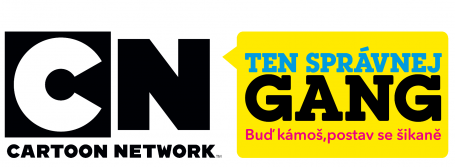Cartoon Network and Safety Line launch campaign with YouTuber Kovy to stamp out bullying in Czech Republic

CN Buddy Network, the successful anti-bullying campaign of children’s TV channel Cartoon Network has partnered in the Czech Republic with the Safety Line Association (Linka bezpečí) and YouTuber Kovy to draw attention to the issue of bullying. The campaign’s tagline ‘Be A Buddy, Not A Bully’ promotes kindness and friendliness, and aims to show children through two videos that being different is no reason for being bullied, and that being a bystander and doing nothing is not acceptable.
“We are delighted to introduce our EMEA-wide anti-bullying campaign, CN Buddy Network, to the Czech public. Cartoon Network provides children with a place where they can be confident, happy and, most importantly, themselves. We know that bullying affects many of our young viewers and together with our partner Linka Bezpečí and our ambassador Kovy, we aim to show children that they can stand up to it by being friendly and supportive and by involving a trusted adult. We want to talk about this difficult issue in a way that children understand and show them where to look for help. Being a kid-dedicated and trusted platform, Cartoon Network is in a unique position to raise awareness of the problem and stimulate positive conversations and actions around it,” says Malgosia Chapman, vice president of Brand and Content Engagement and Head of Kids Channels, Turner Germany & CEE.
The number of children calling the support group Safety Line is rising and although they receive 159,481 phone calls, 2,707 emails and 2,167 chats. Daily the Safety Line receives about 430 contacts from children, out of which 5 to 6 are about bullying. In 2018, there were 2,182 contacts, which is an increase of 100 contacts compared to the previous year. It is strongly believed that the problem of bullying and cyber bullying is still underreported. That’s why Cartoon Network is running this campaign – to show that it’s good to be different and work to ensure that children, parents and teachers know how to access the support available to them.
“The problem of bullying comes up in only 7% of all contacts that kids make with Safety Line, either over the phone, email, or through chat,” says Regina Jandová of the Safety Line. “Last year, we advised children about cyberbullying in only 1% of all communication. Specifically, the topic of cyberbullying itself involves five children a month.”
The relatively small percentage of calls contrasts sharply with the real level of bullying and cyberbullying situations. “Not everyone who is a victim of some form of bullying reaches out for help, because that person may fear the reactions of the people around them, or may feel ashamed or guilty that he or she has got into this situation,” Jandová says.
Bullying can happen for no reason. “Every child is at risk of being bullied. The trigger can be anything, from ‘bad’ clothes to ‘bad’ responses to anything. Apparently, there is no exact guide on how to prevent bullying. Self-confidence and not being alone to deal with these issues play an important role in its solution,” adds Jandová.
Bullying not only involves verbal and physical assaults, but can also be at first glance innocent nudging away or exclusion from the group. Cyberbullying is even more ‘sophisticated’, because it takes place in the online space where the victim often doesn’t even know the aggressor and can be continuous. The online environment of cyberbullying also changes the character and size of the ‘bystanders’ who witness the bullying but often do not intervene.
The most common form of cyberbullying includes verbal attacks, online account penetration, threats and intimidation, harassment, blackmail, and embarrassment by spreading photos, video and audio.
“Cyberbullying is a phenomenon that really affects the young and has a demonstrable impact on the victim. However, it is also very important to look for the causes because it often comes about as revenge for a perceived or actual injustice that the perpetrator has experienced. The victim is then seen as an easy target of offender. The basis for the solution is primarily the correction of the school climate, ensuring good relations between students, teachers and parents,” says Kamil Kopecký, Ph.D., head of the E-Bezpečí project at Palacký University in Olomouc.
The ‘Be A Buddy, Not A Bully’ campaign ambassador, Kovy, a popular Czech internet personality, said “I have seen bullying in my childhood in various forms in most environments. When this phenomenon is spoken about, we often hear the stories of the bullied, the brave ones, who have stood up for the one bullied, or those who are the bullies. But the biggest group is the bystanders – the crowd who feel it’s not their problem. That is exactly what I want to emphasize in the Czech part of the campaign, so that even those who are not direct participants in the bullying realize that they have a responsibility; they are part of the problem and have a chance to help.”.
The ‘Be A Buddy, Not A Bully’ campaign supporters are also: O2 Czech Republic, Skylink, T-Mobile Czech Republic and Digi.
Video Links: https://www.youtube.com/watch?v=w3P4I_Bjzz8&feature=youtu.be